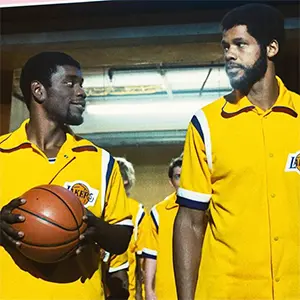How Winning Time wrestles with Blackness is more important than its portrayal of basketball
-

"Much of the reaction to HBO’s Winning Time: The Rise of the Lakers Dynasty has focused on Jerry West’s threat of Supreme Court litigation or the way the fictionalized series denigrates the team’s female executives," says Justin Tinsley. "But it’s the storyline about how the team’s two biggest stars approach Blackness that ultimately could decide the legacy of the show. On the surface, Magic Johnson and Kareem Abdul-Jabbar (who has voiced his frustrations with the series) were polar opposites when their journey began together in the 1979-80 season. As the largely white media told it back then, Abdul-Jabbar was the combative superstar whose game was as unstoppable as his personality was uninviting. Johnson was the charismatic floor general whose game was as euphoric as his personality." Tinsley adds: "Now comes the challenge of how much the producers of Winning Time want to expose the reality that’s there for the taking. Black people have never been nor ever will be monolithic. Magic Johnson and Kareem Abdul-Jabbar are a direct reflection of this truth. Despite the series’ admitted dramatization – and the drama it stirred up – how far it goes into the complexities of Black America matters deeply. Not from a basketball perspective. Basketball is the least interesting aspect of the series. What matters is portraying the essence of who Johnson and Abdul-Jabbar were then. And, more importantly, who they became."
ALSO:
- John C. Reilly says Winning Time would've had even more trouble with facts if its subjects were involved: "The overall plot is based on historical fact, but we do fill in a lot of blanks," Reilly tells Vulture when asked about Jerry West demanding a retraction and apology. "I knew it would be difficult for the people involved in this story to see their lives depicted in a semi-fictional way. But that doesn’t mean this story shouldn’t be told. The truth is these were crazy times. There was anger and betrayal, and the sh*t was hitting the fan. I respect everyone’s right to their own story, but I don’t think that precludes others from telling public stories. And this is a public story. People have said, 'How can you tell the story of the Lakers without the Lakers themselves?' And my answer to that is, 'How could you tell it with them?”
- Winning Time music supervisor Gabe Hilfer wanted to shine a spotlight on “artists who might not be making money anymore," plus lesser-known hits from well-known artists
- Spencer Haywood scene from the end up this week's episode actually happened
TOPICS: Winning Time: The Rise of the Lakers Dynasty, HBO, Gabe Hilfer, John C. Reilly, Kareem Abdul-Jabbar, Magic Johnson, Quincy Isaiah, Solomon Hughes, Spencer Haywood, African Americans and TV, Music and TV
More Winning Time: The Rise of the Lakers Dynasty on Primetimer:
